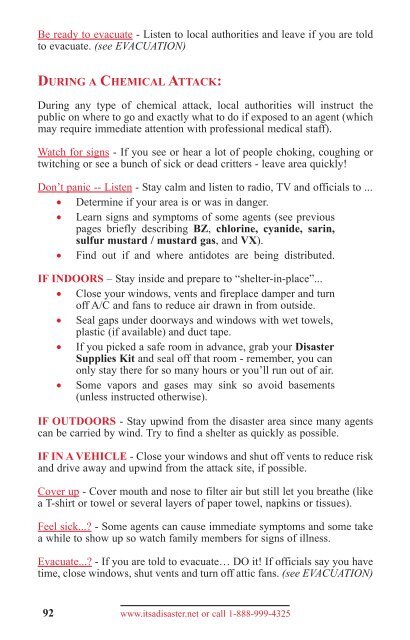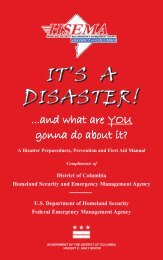disaster 5th 1108_5th ed 2011 - Homeland Security and Emergency ...
disaster 5th 1108_5th ed 2011 - Homeland Security and Emergency ...
disaster 5th 1108_5th ed 2011 - Homeland Security and Emergency ...
You also want an ePaper? Increase the reach of your titles
YUMPU automatically turns print PDFs into web optimized ePapers that Google loves.
Be ready to evacuate - Listen to local authorities <strong>and</strong> leave if you are told<br />
to evacuate. (see EVACUATION)<br />
DURING A CHEMICAL ATTACK:<br />
During any type of chemical attack, local authorities will instruct the<br />
public on where to go <strong>and</strong> exactly what to do if expos<strong>ed</strong> to an agent (which<br />
may require imm<strong>ed</strong>iate attention with professional m<strong>ed</strong>ical staff).<br />
Watch for signs - If you see or hear a lot of people choking, coughing or<br />
twitching or see a bunch of sick or dead critters - leave area quickly!<br />
Don’t panic -- Listen - Stay calm <strong>and</strong> listen to radio, TV <strong>and</strong> officials to ...<br />
• Determine if your area is or was in danger.<br />
• Learn signs <strong>and</strong> symptoms of some agents (see previous<br />
pages briefly describing BZ, chlorine, cyanide, sarin,<br />
sulfur mustard / mustard gas, <strong>and</strong> VX).<br />
• Find out if <strong>and</strong> where antidotes are being distribut<strong>ed</strong>.<br />
IF INDOORS – Stay inside <strong>and</strong> prepare to “shelter-in-place”...<br />
• Close your windows, vents <strong>and</strong> fireplace damper <strong>and</strong> turn<br />
off A/C <strong>and</strong> fans to r<strong>ed</strong>uce air drawn in from outside.<br />
• Seal gaps under doorways <strong>and</strong> windows with wet towels,<br />
plastic (if available) <strong>and</strong> duct tape.<br />
• If you pick<strong>ed</strong> a safe room in advance, grab your Disaster<br />
Supplies Kit <strong>and</strong> seal off that room - remember, you can<br />
only stay there for so many hours or you’ll run out of air.<br />
• Some vapors <strong>and</strong> gases may sink so avoid basements<br />
(unless instruct<strong>ed</strong> otherwise).<br />
IF OUTDOORS - Stay upwind from the <strong>disaster</strong> area since many agents<br />
can be carri<strong>ed</strong> by wind. Try to find a shelter as quickly as possible.<br />
IF IN A VEHICLE - Close your windows <strong>and</strong> shut off vents to r<strong>ed</strong>uce risk<br />
<strong>and</strong> drive away <strong>and</strong> upwind from the attack site, if possible.<br />
Cover up - Cover mouth <strong>and</strong> nose to filter air but still let you breathe (like<br />
a T-shirt or towel or several layers of paper towel, napkins or tissues).<br />
Feel sick... - Some agents can cause imm<strong>ed</strong>iate symptoms <strong>and</strong> some take<br />
a while to show up so watch family members for signs of illness.<br />
Evacuate... - If you are told to evacuate… DO it! If officials say you have<br />
time, close windows, shut vents <strong>and</strong> turn off attic fans. (see EVACUATION)<br />
92 www.itsa<strong>disaster</strong>.net or call 1-888-999-4325





